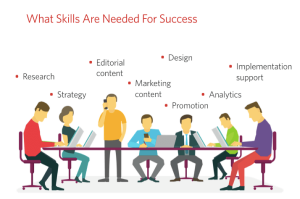— October 27, 2017

QuinceMedia / Pixabay
Halloween is right around the corner, and with it come haunted houses, trick-or-treating and scary movies. Small business owners can capitalize on this time of year with related activities including seasonal marketing opportunities, costume contests and candy giveaways.
There are also tips that can be gained from spooky films — beyond the screams and shocks. Here’s a look at some lessons that can apply to small businesses.
Priorities
Steven Spielberg’s 1975 classic Jaws has loads of frightening shark moments. But the leadership displayed by the mayor is fairly scary, too. Mayor Larry Vaughn (played by Murray Hamilton) is so concerned with generating revenue on the Fourth of July weekend that he prioritizes economics over the safety of people at the beach. Meanwhile, a hungry great white shark is lurking.
Business lesson: Though some in business may put money as the top priority, plenty of others will say it’s about people, and success stems from them. Virgin founder Richard Branson is a proponent of prioritizing employees, which then boosts customer service, as Oscar Raymundo writes in a story for Inc.com.
“As Branson sees it, the formula is very simple: Happy employees equal happy customers. Similarly, an unhappy employee can ruin the brand experience for not just one, but numerous customers,” Raymundo notes. “ … By not treating employees well, companies risk losing customers over bad service. To this end, Branson says he has made sure that Virgin prioritizes employees first, customers second, and shareholders third.”
“Effectively, in the end shareholders do well, the customers do better, and your staff remains happy,” Branson says in the story.
Bravery
There are several scenes in 1991’s The Silence of the Lambs that show FBI student Clarice Starling (played by Jodie Foster) interacting with incarcerated killer Hannibal Lecter (Anthony Hopkins) to get his insight on a serial-killer case. It’s a daunting task, one that most people might wilt beneath, but Starling’s strength keeps her going.
Business lesson: It takes guts to start a business. Stepping out on your own and putting your faith in your abilities to succeed is no small feat. Steve Tobak explores this for Entrepreneur.
“It’s easy to play it safe, so that’s what the vast majority of us do throughout our lives,” he writes. “That’s not a bad thing, as long as your expectations are consistent with that. If you set the bar low, that’s all you can expect to achieve. If, on the other hand, you want to be successful and accomplish great things in life, you have to be willing to make tough decisions that put yourself and others at risk when your gut tells you it’s the right thing to do. Not only is that hard, it’s terrifying. But being brave in the face of fear is the mark of a true leader.”
Kindness
The 1976 film Carrie features some of the worst cases of bullying ever put on screen. Many of the teenagers around the title character (played by Sissy Spacek) are cruel, culminating in a prank that goes awry for everyone.
Business lesson: Though business can be ruthless, there is room for kindness. It can help strengthen relationships with employees, peers and clients. Beth Taylor of PayScale writes about the importance of kindness — including self-compassion — in a story for Business Insider.
“Being kind to yourself may make you more successful,” she writes. “Berating yourself for every little mistake does not help you do better. Rather, forgive yourself and examine your mistakes in an attempt to do better. Look at your strengths and capitalize on those. Energy spent feeling angry at yourself will bring you down. Caring about your own well-being and caring about others go hand in hand. You can develop consistent behaviors showing kindness and respect for others, as well as recognizing the strengths, not just the weaknesses, of people in your workplace.”
Smart decisions
One of the more frustrating things about watching a horror movie is seeing the terrible decisions that characters make: Don’t go in that house, don’t open that door, don’t go camping in a creepy place, don’t ever interact with scary clowns. The 1974 film The Texas Chainsaw Massacre is a good example, when teenagers pick up a hitchhiker that clearly is not someone with whom you’d want to spend any quality time. The unfortunate chain of events in the film kicks off from there.
Business lesson: Who you bring into the business can play a huge role in potential success, so smart decisions in hiring are essential. In a story for smallbiztrends.com, Larry Alton writes that some businesses unfortunately fall into the “warm body syndrome” pattern.
“It’s the unofficial name for the practice of hiring people just to fill a spot,” he explains. “If you’ve ever said something like — ‘We can’t afford to have that position open any longer — let’s just hire him.’ — you’ve settled for a warm body. The problem with warm bodies is that they’re rarely the right hire. If you hire too many warm bodies, you’ll end up with high turnover, bad performance, and low employee satisfaction. Even if it means waiting a couple of months until the right person comes along, don’t settle for an average candidate.”
Have a sense of humor
Horror movies that provide laughs and scares are somewhat rare. One that succeeds on both counts is the 2004 film Shaun of the Dead. The title character (played by Simon Pegg) and his sidekick Ed (played by Nick Frost) are comical throughout a zombie attack.
Business lesson: Humor can make a huge difference in a work environment, but it can also be tricky. Anything that could be considered offensive can be extremely problematic, so a business owner should have a clear idea of where the line is and avoid crossing it. When humor stays away from that troublesome territory, it can help to lift the spirits of an office, as author Laura Vanderkam says in a Forbes story by Jacquelyn Smith.
“People want to work with people they like,” she says. “Why wouldn’t you? You spend huge chunks of your waking hours at work, so you don’t want it to be a death march. Humor — deftly employed — is a great way to win friends and influence people. You need to be funny, but not snarky (that’s not good for team building) and you can’t offend anyone.”
The importance of sleep
In the long-running horror series A Nightmare on Elm Street, bad guy Freddy Krueger haunts teenagers in their dreams. So to avoid these nightmare scenarios, they try to stay awake at all costs. When they inevitably drift off, the trouble begins.
Business lesson: Since there’s no Freddy to fret about, we can take the reverse approach to our sleeping patterns. It’s wise for business owners to get a good and consistent amount of sleep. When sleep is pushed far down the priority list, the negative effects can add up. As Firas Kittaneh writes for Entrepreneur, sleep deprivation causes irritability, forgetfulness, a lack of concentration and energy.
“A combination of any of these effects is hardly optimal for achieving success, especially when running a business,” he says. “ … The human body lacking sufficient sleep is more likely to gain weight, have higher blood pressure and be at a higher risk for diabetes and heart attacks. So, if you’re running a company, pay attention to your sleep cycle; that way, you won’t pay the price. Keeping your body in tip-top shape will also ultimately mean less time out of the office due to poor health, and more time for the (nonwork activities) you love.”
Business & Finance Articles on Business 2 Community
(70)
Report Post






